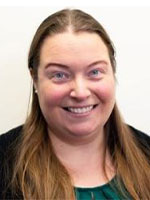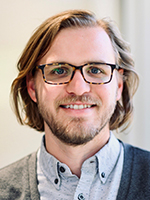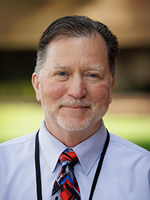2024-2025 Fellows

Sarah Kennedy, MPH
Sarah Kennedy, MPH
Field Specialist- Community Development, Early Childhood Impact, University of Missouri Extension
Project Title: Activating Civic Leaders to Address the Childcare Crisis in the North Central Region
Project Summary: The NCR-Stat: Caregiving Survey, developed by previous NCRCRD fellows, is a regional household survey with a primary focus on understanding caregiving dynamics and their impact on economic development in the North Central Region (NCR). This fellowship will leverage these survey results by transforming the data into action through a toolkit of strategies and fostering communities of practice amongst the NCR states.
The NCR-Stat: Caregiving survey serves as a foundation for researching, developing, and piloting this toolkit across NCR communities. Additionally, this project would establish a model for communities of practice, collaborative learning and knowledge-sharing among stakeholders throughout the region.
Early child care emerges as a central caregiving concern. The fragmented and complex child care system for children aged 0 to 5 significantly influences the economic well-being of NCR states. The United States economy grapples with an annual loss of approximately $122 billion due to child care challenges (Forbes, 2023). While child care is pivotal for workforce support, the cost of quality child care has skyrocketed. Families, on average, allocate 15% of their income to child care (Federal Reserve Bank of St. Louis, 2021).
Addressing this broken system necessitates fresh insights, innovative models and transformative approaches. Sarah Kennedy, from the University of Missouri Extension, will lead this project, employing a collective impact strategy to translate survey data into actionable change across the NCR.
Due to a temporary Federal funding pause in 2025, Sarah Kennedy’s Fellowship has been extended.

Samuel Mindes, Ph.D.
Samuel C.H. Mindes, Ph.D.
Adjunct Assistant Professor, Rural Sociology, Department of Sociology and Criminal Justice
Iowa State University
2024 Project: Rural Gentrification and Housing Disparities in the North Central Region
Project Summary: The proposed project combines qualitative and quantitative sociological research to investigate rural housing disparities in the North Central Region (NCR). This mixed methods research project involves two interrelated components led by rural sociologist Dr. Samuel Mindes of Iowa State University.
Mindes will design a regional housing survey based on his work with the NCR Housing Working Group, led by Lisa Bates of Iowa State University Extension and Outreach. The group’s regular virtual meetings offer an opportunity to identify critical issues relating to housing and related topics in the region. Survey development will commence during Spring 2024 with the assistance of an undergraduate student researcher. It will be pre-tested in the undergraduate methods course Mindes teaches that semester. The survey will be finalized in Summer 2024 and distributed in Fall 2024. Mindes will create reports based on his analysis of the survey.
The qualitative research component involves ethnographic research in amenity-rich rural Lake Michigan communities with recent histories of gentrification, seasonal residential patterns, and economic development among growing disparities. Using his ties to the area, Mindes will gather data using various qualitative methods, such as interviews, observation, focus groups, and visual methods. He will focus the data collection to investigate how residential patterns and economic development efforts affect placemaking, place attachment, and community attachment among long-term, recent, and temporary residents. Data collection will take place across several trips to the region during Summer 2024. Findings from the qualitative research will inform the regional housing survey and Mindes’ future research and extension efforts.
* * * * *
2025 Project: Housing, Identity, and Rural Resilience in the North Central Region
Project Summary: The proposed project examines challenges related to housing, workforce, and community change, which are crucial aspects of rural resilience in the North Central Region. By analyzing quantitative data from an NCR-STAT survey on housing and food security and conducting an in-depth qualitative case study of a rural Midwest community centered around tourism, these two interconnected components will provide a comprehensive understanding of the key challenges affecting rural livelihoods. Building on previous work as a 2024 NCRCRD Fellow, during which he designed the survey and spent over 150 hours in the field, PI Mindes will enhance this study by producing reports, presentations, and peer-reviewed publications. In the proposed period, Mindes will perform descriptive and inferential analyses of the housing and food security survey data, which will be communicated to regional stakeholders through various platforms. The findings, patterns, and trends will inform decision-makers. In 2024, Mindes collected in-depth ethnographic data from an amenity-rich rural community on the Great Lakes, gathering information through observations, interviews, and focus groups. Preliminary analysis indicated that the community faced challenges related to housing, workforce, and community change. During the proposed period, Mindes will visit the field site for additional data collection to explore these themes and continue qualitative analysis. Furthermore, he will identify a comparative site in Iowa to extend the project. The qualitative research will lead to conference presentations and peer-reviewed publications. This proposed multi-method project aims to strengthen rural resilience by deepening our understanding of critical issues facing the region and investigating community change.
NCRCRD accepts Fellow proposals on a rolling basis throughout the year and encourage others to submit projects. Fellow proposal guidelines are listed on our Grants and Fellowships page.
2023 Fellow

Armin Yeganeh, Ph.D.
Armin Yeganeh, Ph.D.
Assistant Professor, School of Planning, Design and Construction
Michigan State University
Project Title: Satellite-based Automated Data Collection and Visualization for Mobile Home Park Analysis Using Computer Vision
Project Summary: The North Central Regional Center for Rural Development has acknowledged the critical need to invest in physical infrastructure as the top priority for the development of rural communities in the next five years. Affordable housing is a key area requiring attention. To facilitate this development, the Center aims to foster collaboration for survey development, enhance data collection methods, and acquire robust data to overcome barriers to regional research across time and space. Mobile home parks are the largest source of unsubsidized, affordable housing in the United States, comprising approximately 6.2% of the American housing stock and housing 5.6% of the population. Studies emphasize the significance of these community forms in providing affordable housing, which benefit local businesses by ensuring a stable workforce and customer base. However, there is limited literature on mobile home parks and there is no systematic data on the count, footprint, or location of these communities.
We propose using computer vision and satellite imagery segmentation as a cost-effective and scalable solution to automated data collection. We will develop a publicly available web database and GIS map resource that enables automated longitudinal data collection with minimal human involvement for recording the physical characteristics of mobile home park communities. This resource offers valuable insights into housing risks and opportunities in the North Central Region. It aids targeted development initiatives, infrastructure resilience, and disaster preparedness by detecting changes and vulnerabilities over time. These insights inform proactive measures to enhance economic well being and resilience in rural communities.
2022 Fellows

Shoshanah Inwood, PhD
Shoshanah Inwood, Ph.D.
Rural Sociologist and Associate Professor
School of Environment and Natural Resources
The Ohio State University
Project Summary: Caregiving is a critical rural development issue that affects all sectors of the economy. Broadly, the Centers for Disease Control & Prevention defines caregivers as those who “provide care to people who need some degree of ongoing assistance with everyday tasks on a regular or daily basis. The recipients of care can live either in residential or institutional settings, range from children to older adults, and have chronic illnesses or disabling conditions.” Caregivers may be paid or unpaid and caregiving occurs in both the formal and informal economy. The availability, quality, cost, and value of caregiving in the United States has long been fraught, these issues have all been exacerbated by the COVID-19 pandemic. To better understand how caregiving currently intersects with and affects community and economic development in the North Central Region, the theme of the 2023 NCRCRD regional survey is “caregiving.”
As a NCRCRD Fellow, Dr. Inwood proposes to coordinate with the NCRCRD to lead the development, implementation, and analysis of the 2023 NCRCRD Caregiving Survey. The resulting data set will be housed at the NCRCRD and following Center protocols and policies will be used for interdisciplinary collaboration across states and across research and Extension.
Faculty Collaborator

Florence Becot, Ph.D., M.Sc.
Florence Becot Ph.D., M.Sc.
Associate Research Scientist
National Farm Medicine Center
Marshfield Clinic Research Institute
Project Summary: Working in close collaboration with Dr. Shoshanah Inwood from The Ohio State University, Dr. Florence Becot from the National Farm Medicine Center will support the development, implementation, and analysis of the North Central Region Caregiving Survey.
More specifically Dr. Becot will:
- Participate in identifying the Caregiving Survey Team, an advisory group of research scholars and Extension professionals working in the field of caregiving.
- Work in collaboration with the Caregiving Survey Team to define the objectives and scope of the survey; research and develop survey questions; and develop a data analysis plan.

Stephen Gavazzi, Ph.D.
Stephen M. Gavazzi, Ph.D.
Professor, College of Education and Human Ecology
The Ohio State University
Project Title: Understanding and Advancing Partnerships Among 1994 and 1862 Land-Grant Universities in the North Central Region
Project Summary: Stephen M. Gavazzi, professor of Human Sciences at The Ohio State University, recently was awarded a conference grant from the National Institute of Food and Agriculture (NIFA). In collaboration with the American Indian Higher Education Consortium (AIHEC), this NIFA grant will be used to host a pre-conference in front of the 2022 First Americans Land-grant Consortium (FALCON) Conference. This pre-conference is designed to focus attention on past, present, and potential future partnerships between 1994 land-grant Tribal Colleges and Universities (TCUs) and their sister 1862 land-grant universities (LGUs). This proposal seeks support for work conducted both prior to and following the October 2022 pre-conference.
Activities preceding the conference (July 2022-September 2022) will center on classifying the defining features of past and present 1994-1862 partnerships throughout the North Central Region. These pre-conference activities will include both larger-scale survey methods as well as one-on-one interviews with personnel attached to these 1994-1862 partnerships. Defining features will include, but not be limited to, characteristics associated with mission-specific classification (teaching, research, community engagement), funding sources, and evaluation strategies to date. Efforts conducted as a follow-up to the October pre-conference (November 2022-June 2023) will surround the implementation of a needs assessment which will determine the gaps that exist between current partnerships that serve Tribal families and communities and what might optimally be carried out by these sister institutions. Again, both larger-scale survey methods and one-on-one interviews will be employed as data-gathering strategies.
For more information on the Land-Grant Partners Project visit https://landgrantpartnerships.org/.
